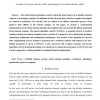151 search results - page 22 / 31 » A Cost Analysis of Solving the Amnesia Problems |
TEC
2002
13 years 7 months ago
2002
The clonal selection principle is used to explain the basic features of an adaptive immune response to an antigenic stimulus. It establishes the idea that only those cells that rec...
ATAL
2008
Springer
13 years 9 months ago
2008
Springer
Computational grids offer users a simple access to tremendous computer resources for solving large scale computing problems. Traditional performance analysis of scheduling algorit...
CHES
2005
Springer
2005
Springer
Scalable Hardware for Sparse Systems of Linear Equations, with Applications to Integer Factorization
14 years 1 months ago
Motivated by the goal of factoring large integers using the Number Field Sieve, several special-purpose hardware designs have been recently proposed for solving large sparse system...
JPDC
2006
13 years 7 months ago
2006
We present provably efficient parallel algorithms for sweep scheduling, which is a commonly used technique in Radiation Transport problems, and involves inverting an operator by i...
CVPR
2009
IEEE
15 years 1 months ago
2009
IEEE
We have developed methods for segmentation and tracking of cells in time-lapse phase-contrast microscopy images. Our multi-object Bayesian algorithm detects and tracks large num...

